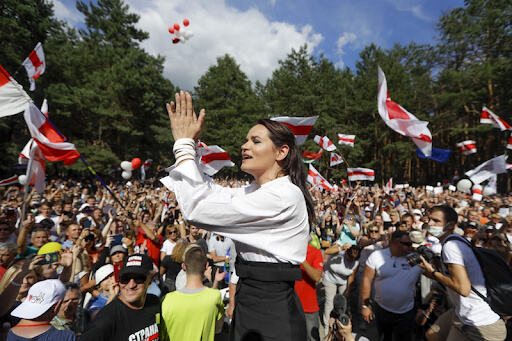Since the Romantic age, every time a society brings a fight in the streets against an alleged regime, Western countries everywhere cheer, with the belief that the unrest is a step towards the idea of “modern democracy.”
Nowadays the same is happening for Belarus, where the former-Soviet president Lukashenko has ruled as a dictator for over 26 years. Recent election results, in which Lukashenko has claimed 80% of the votes, has been questioned thousands of demonstrators, led by Sviatlana Tsikhanouskaya, the main challenger of Lukashenko. The results have also not been recognized by the European Union.
Tsikhanouskaya, now in exile in Lithuania, stated that her main goal is free and fair elections, where voting rights are not manipulated by the Belorussian establishment linked to Lukashenko.
Tsikhanouskaya was not able to afford her electoral campaign alone, she was backed and funded by many people related to the traditional Belorussian political class, including Valery Tsepkalo, a former ambassador to the USA and Mexico and, moreover, a former aide of Lukashenko himself.
That is the reason why the Belorussian revolt seems to be also an internal settlement of accounts between two sides of the local establishment, one closer to Russia and one to the West.
Indeed, if we don’t look at the protests with an ideological view, we will see how the whole scenario is a geopolitical matter in a country which is a crossroads in the exact middle of two political blocks: the Russian Federation and the European Union, which is now trying to seize control of a strategic outpost in the eastward run that both the EU and the NATO are taking to weaken Russian control on Eastern Europe.
Of course, the masses demonstrating in Minsk are seeking freedom, but, even if they are so romantic and brave, we must not be distracted from the geopolitical implications of these uprisings, where the main characters are not Lukashenko and Tsikhanouskaya, but Ursula Von Der Leyen, EU Commissioner, Angela Merkel, German Chancellor, and Vladimir Putin, Russian Head of State.
But yet in this list there’s a big absence, Mr Trump, who is not taking a strong stand in the entire Belarussian crisis, despite diplomats like John Bolton who are prompting him to do so.
According to the Philadelphia Inquirer, Trump’s lack of stance is due to his secret will to behave like Lukashenko in the next November Election Day, but to this outside observer, this is quite impossible because the White House would never be allowed to imprison opponents like in Belarus, or to falsify results.
Instead, what probably pushed Washington not to take a strong public stand in today’s crisis are geopolitical reasons.
As a matter of fact, the Belorussian one is not the only internal settlement of accounts which is taking place in the global scenario, where EU and USA are peacefully struggling in order to be the leading power of the West.
Since the EU has decided to pursue an own geopolitical strategy in Eastern Europe, the USA is slowly losing influence there, as it is Brussels who is now alone facing Moscow in countries like Ukraine, Belarus or the nations overlooking the Baltic Sea.
Nevertheless, this may not be the biggest reason why Mr Trump is not handling the Belarussian crisis with severe measures like sanctions.
With the US election coming it would not be convenient for him to engage in an endless crisis in Eastern Europe, just one border away from Russia, with the huge risk of a war if something bad happens, like a Russian invasion. Besides, an USA intervention would make the EU officials upset and it would prompt an international crisis, screwing up all the foreign relations that Washington has on the other side of the Atlantic Ocean.
That is probably one of the reason why literally no one amidst the Belarussian demonstrators has asked the help of the USA, as happened in Hong Kong.
Nevertheless Belarus’s geographical proximity to both Russia and Europe is not only a danger, but also one reason why the US cannot afford to ignore everything that is happening there, because while heavy interference will make all Washington’s allies, not acting at all will make Washington lose its supremacy on international politics.
So, today US diplomacy has to do its best to show how the USA is still a leader worldwide, while avoiding crises that would be caused by a reckless interventionism that no one can afford.
However, we should not believe that, even if Lukashenko fell, Belarus would soon become a free and fair democracy, as the country does not have this kind of history. The international scenario is not a film where, after the “THE END”, the two lovers keep their feelings alive and bury all their past conflicts.
Despite Tsikhanouskaya seeming to be an innocent Joan of Arc, struggling for her country and her sons, she herself admitted that she would be only a transient leader toward democracy, but freedom is not a present you receive after you defeat the villain, as there are many steps to be completely free.
First of all Belarus, does not need any more people already involved in the Lukashenko regime, as many of Tsikhanouskaya’s supporters are, while secondly, Belarus has to free its economy from the chains of some global investors.
Indeed Belarus does not seem to be able to be independent from the Russian economy, which claims 46.3% of its exports and 54.2% of its imports. Both industry and the rural economy depend on the Russian market, as it is for the oil supplies.
As long as Belarus doesn’t break the economic ties with Russia, it doesn’t matter who rules in Minsk, because Moscow will always control the survival of the local facilities, which are still organized as during the Soviet age.
Thence, both Tsikhanouskaya and Lukashenko are only chess pawns of an international game where the EU is the main challenger of Russia, as Brussels is both the second export (23.6%) and import (19.8%) partner of Belarus.
In this scenario, Tsikhanouskaya is the puppet of the European will to expand eastward, while Lukashenko is the puppet of the Russian resistance in a capitalist war between two models, the Russian state capitalism and the liberal one promoted by the EU.
Historically Belarus has always been near to the middle of these two fires and the USA has never counted a lot there, but nowadays something can change, because the Belarussian uprisings is intertwined with lots of other crises, like the Syrian, the Crimean or the oil ones.
These are the reasons why the USA can use its weight to achieve the best solution possible in Belarus both for its interest and for the Belarussian democracy.
The only role now available for the States is the ref, because, even if Washington has no roots on the Belarussian territory, it must be careful of whatever happens there, as Eastern Europe is becoming a new center of world politics.
Now more than ever, China should not be the only concern US officials must pay attention to.
Photo caption FILE In this file photo taken on Sunday, Aug. 2, 2020, Sviatlana Tsikhanouskaya, candidate for the presidential elections greets people waving old Belarus flags during a meeting to show her support , in Brest, 326 km (203,7 miles) southwest of Minsk, Belarus. Tsikhanouskaya, 37-year old former English teacher without any political experience seems an unlikely challenger to the authoritarian leader of Belarus, whose rule has spanned more than quarter-century. (AP Photo/Sergei Grits, FILE)
Author
-

Dario Pio Muccilli is the Star-Revue’s Italian correspondent, based in Turin. Email him at muccillidariopio@gmail.com
View all posts
Dario Pio Muccilli is the Star-Revue’s Italian correspondent, based in Turin. Email him at muccillidariopio@gmail.com










